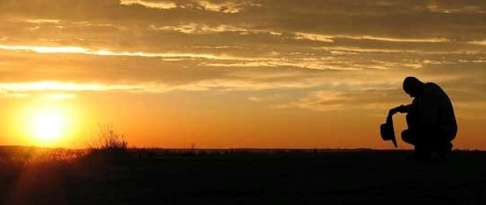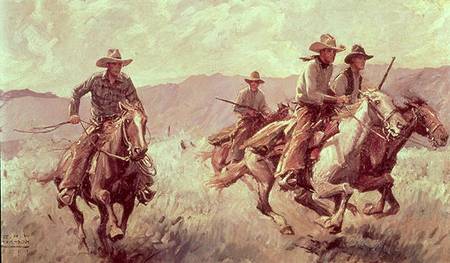Written by Brent Borman. November 10, 2014.
“The Master’s Call” is a song featured on Marty Robbins’ iconic 1959 album Gunfighter Ballads and Trail Songs. Written and performed by Robbins in a strophic song structure, “The Master’s Call” is a redemptive tale about a young man who leaves home behind to plunder and rob as an outlaw. One night the speaker is rustling cattle, which was once “a common hazard of early settlers in Texas,” when he finds himself reflecting upon his sinful life (Gard). Distracted by strange voices and visions, the narrator is thrown from his pony and faced with the stampeding herd of cattle. The narrator cries out for mercy and witnesses the face of Jesus Christ in a flashing bolt of lightning. The same bolt of lightning kills the charging cattle, thus saving his life and reaffirming his faith in God. The song’s intended message is that God has a reason for everything, and it ends with the narrator devoting his life and soul to his savior.
From the moment “The Master’s Call” begins we are subject to somber background vocals mournfully singing alongside a soft guitar harmony. These aspects immediately set the tone of the track before any words are exchanged. Thus by the time that Robbins sings the first line, “When I was but a young man I was wild and full of fire,” we already have the feeling that this is going to be a sad tale. Sure enough, the speaker ends up leaving his parents to lead a life of sin. Since it is composed in the strophic form, the instrumentation does not change much during the course of the song. However, “The Master’s Call” is a powerful song that builds in intensity as the song progresses, and Robbins’ vocal inflections convey a considerable emotional depth to the listener. Robbins sings with passion, and he sings less calmly and more passionately as the song builds. We can truly feel the remorse in his voice as he sings:
And I cried oh Lord forgive me,
don’t let it happen now.
I want to live for you alone,
oh God these words I vow.
These lines actually lead up to the song’s emotional climax, in which the speaker privately realizes the sinfulness of his life and the years that he has wasted pursuing unjust causes. Robbins’ singing during this verse is powerful and commanding, even when compared to the rest of the song. In fact, this is the one part in which the instruments deviate from their regular structure. The guitar branches out and does its own thing, seemingly reflecting the speaker’s own loss of control. Before long the pace of the song has returned to normal, and the speaker is back to the present moment again and out of the moral dilemmas brewing in his head. As listeners we have to almost readjust after such a raw display of emotion.
The song’s themes of redemption, faith, and devotion are indubitably related to Marty Robbins’ own religious beliefs. When asked in an interview whether he believed God played a role in his career, Robbins had the following to say: “I started praying for this long before I ever got it, and long before I ever got into the business. Because I do believe in prayer. And I prayed for all these things, and God gave me the strength to get them. I have never set up any particular goal. Never. I just let it happen . Because I knew it was going to happen” (Nash 442). Robbins’ faith in a wise and benevolent God are evident in this song, in which a sinner is spared and allowed a second chance at life.

“The Master’s Call” is arguably one of the most powerful tracks from Gunfighter Ballads and Trail Songs. Haunting background vocalists and memorable guitar playing set a somber stage for the listener, but ultimately only serve to complement Marty Robbins’ outstanding talent as a singer and a song writer. This song’s instrumentation, vocals, and overall message make it an incredibly engaging and potentially enlightening experience for listeners.
| Time | Form | Listening Cues | Discussion |
| 0:00 | Introduction | Background vocals, guitar | Sets a somber tone for the rest of the song |
| 0:05 | Verse 1 | “When I was but a young boy…” | Provides background information on the speaker |
| 0:24 | Verse 2 | “I fell in with an outlaw band…” | Details the sinful life that the speaker has been leading in a matter-of-fact type of way |
| 0:43 | Verse 3 | “One night we rustled cattle…” | Brings us to the present situation as the speaker is committing yet another sinful act (cattle rustling) |
| 1:04 | Verse 4 | “And at that moment…” | Swelling vocals give the sense that something extraordinary is happening, and the pause at the end of the verse gives us time to reflect |
| 1:25 | Verse 5 | “So frightened I was thinking…” | Brings us back to the current situation as the speaker’s cattle rustling plan fails |
| 1:44 | Verse 6 | “I felt the end was near…” | Uplifting vocals lead to the climax of the song, in which the speaker witnesses the face of Jesus Christ |
| 2:04 | Verse 7 | “My wicked past unfolded…” | Guitar strays from melody, reflecting speaker’s own loss of control as he pleads for redemption from God |
| 2:24 | Verse 8 | “A miracle performed that night…” | The speaker is saved by an act of God |
| 2:43 | Verse 9 | “A pardon I was granted…” | The speaker compares life to a stormy sea that he no longer has to battle, thanks to his savior |
| 2:58 | Outro | “I gave my life and soul…” | The speaker offers a final affirmation of his faith as the guitar slows the song to a natural conclusion |
Works Cited
Wayne Gard, “CATTLE RUSTLING”, Handbook of Texas Online, accessed November 05, 2014. Uploaded on June 12, 2010. Published by the Texas State Historical Association.
Nash, Alanna. “Marty Robbins.” Behind Closed Doors: Talking with the Legends of Country Music. New York: A. Knopf, 1988. 436-54. Print.

